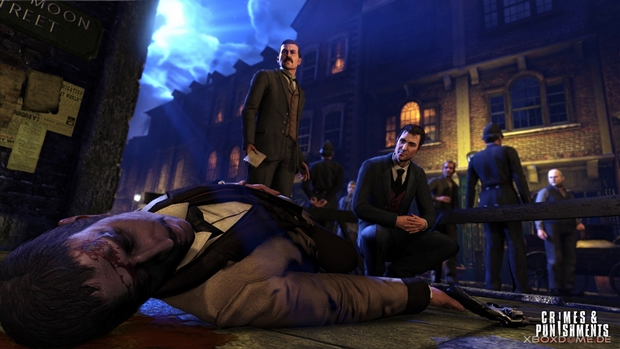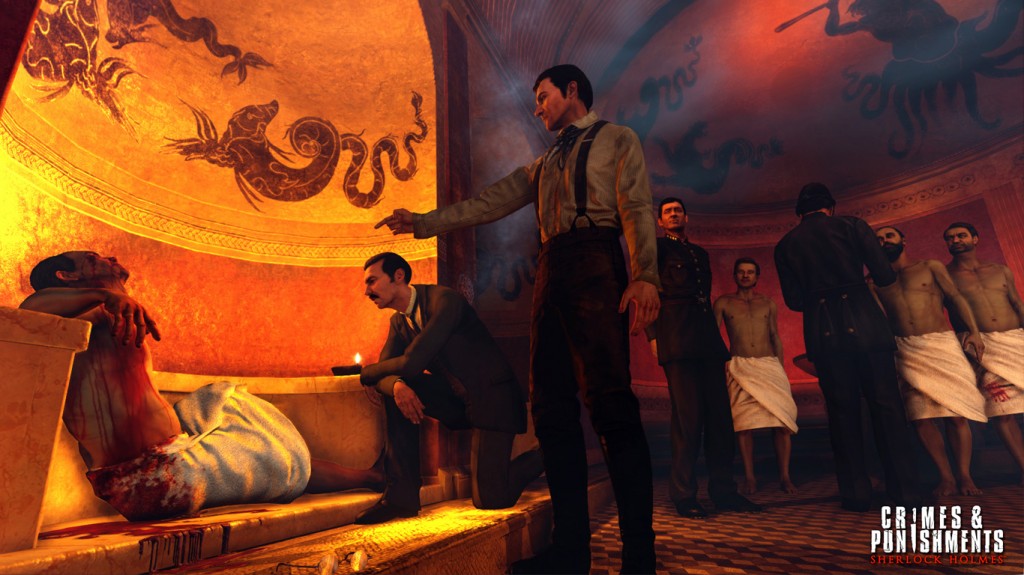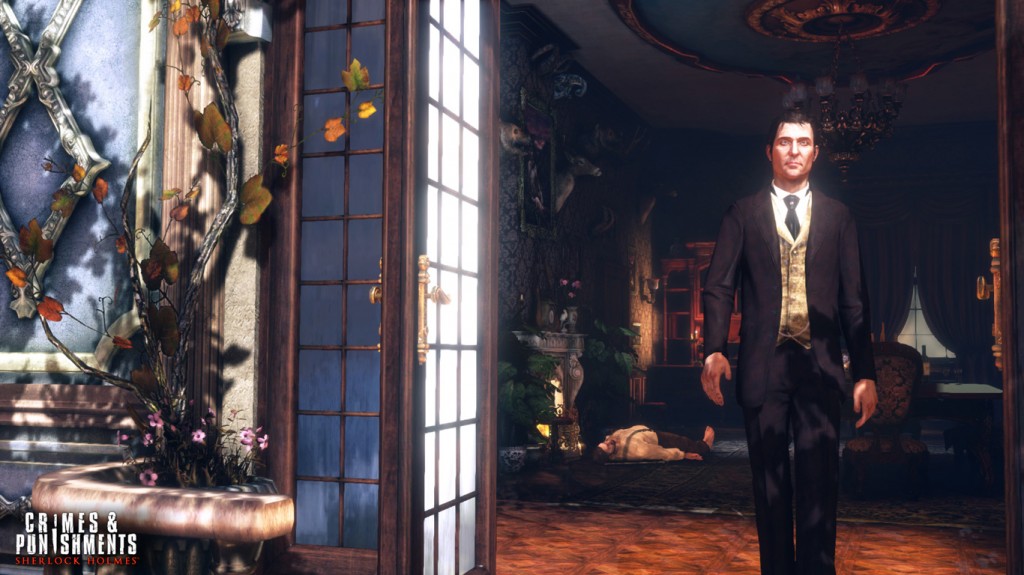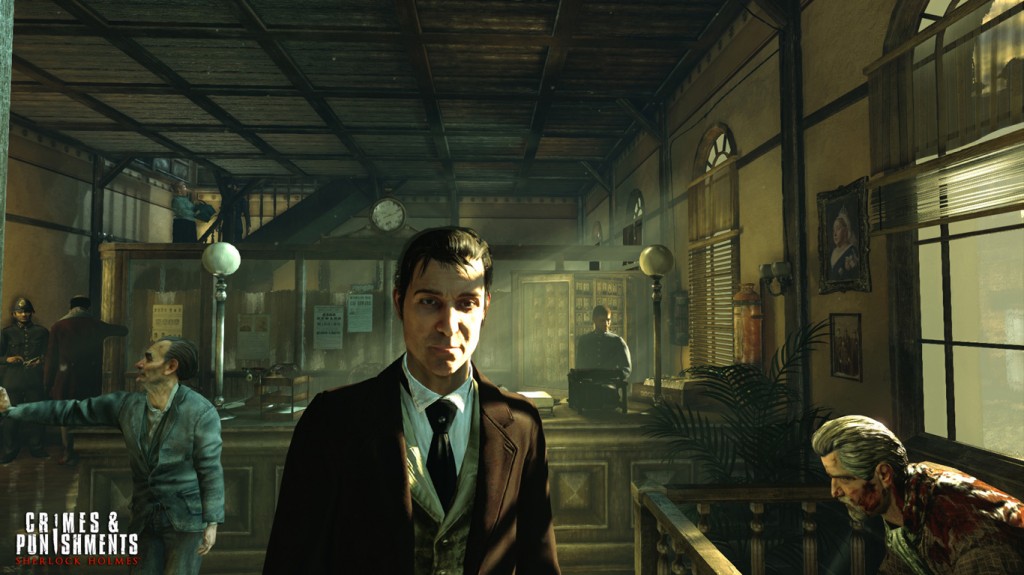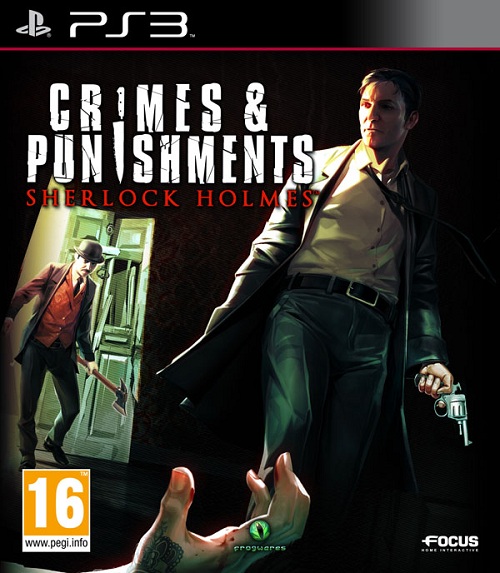
It’s safe to say that Sir Arthur Conan Doyle didn’t really understand the significance of what he had written when A Study in Scarlet, the first novel featuring Sherlock Holmes and Dr. John Watson, was published by in 1886. In fact, Conan Doyle was largely ambivalent about Holmes, despite the character’s immense popularity. At one point, he even raised the prices for stories featuring the character to levels intended to discourage publishers, only to find that they were more than willing to pay the incredibly high prices he asked.
Finally, annoyed by Holmes’ popularity and determined to dedicate more time to his historical novels, Conan Doyle had Holmes and new villain Professor Moriarty plunge to their deaths during an intense struggle in “The Final Problem” in 1893. That death, however, would not last. Public outcry for more Holmes led Conan Doyle to bring the character back for 1901’s The Hound of the Baskervilles, a prequel, before ultimately resurrecting him in 1903’s “The Adventure of the Empty House.” Conan Doyle would never escape Holmes; he published his last story about the character, entitled “The Adventure of Shoscombe Old Place,” three years before his death in 1930.
"Holmes and Watson will travel to the crime scene, interview witnesses, collect clues, interrogate suspects, make deductions, and use the information they collect to pursue new leads in other parts of London. Every clue is important, from the way a man dresses to the size of his shoes and the dirt under his fingernails.
Holmes remains hard to kill, more than 80 years after the death of his creator. The character has become a staple of popular culture, appearing in television, film, video games, and even literature commissioned by the Conan Doyle family. Of all of these depictions, few have been as true to the source material and as respectful of the character as Frogwares’ Sherlock Holmes series, and unlike the good knight that created him, Frogwares seems genuinely excited to continue Holmes’ adventures.
While former games in the series focused on one long, in-depth case, Crimes and Punishments emphasizes a series of smaller, bite-sized investigations that are linked together by their relation to the exploits of the Merry Men, a group of idealistic bandits turned terrorists. Most cases start the same way: Inspector Lestrade of Scotland Yard has, much to the surprise of absolutely no one, gotten stumped on a rather complicated case, and comes to 221 Baker Street to dump it off on Sherlock Holmes. Fortunately for him, Holmes has just finished nearly killing either himself or Watson out of boredom, and is more than happy to take whatever distraction Lestrade has to offer.
The gameplay is pretty straightforward: Holmes and Watson will travel to the crime scene, interview witnesses, collect clues, interrogate suspects, make deductions, and use the information they collect to pursue new leads in other parts of London. Every clue is important, from the way a man dresses to the size of his shoes and the dirt under his fingernails. Holmes studies the people he interrogates, and new information will lead to new conversation options. Understanding the people involved in the case is just as important as knowing the facts. Know someone isn’t telling the truth? Call them on it and watch them squirm. But you have to have the evidence first.
"Getting it might be as simple as finding a sheet of paper on the ground, examining something odd in the environment, hearing references to an event or person that Holmes can identify in his archives, or making use of Holmes’ advanced senses and imagination. More promising clues usually task Holmes with completing mini-games.
Getting it might be as simple as finding a sheet of paper on the ground, examining something odd in the environment, hearing references to an event or person that Holmes can identify in his archives, or making use of Holmes’ advanced senses and imagination. More promising clues usually task Holmes with completing mini-games. One might have you concoct a chemical formula that will allow you to remove smudged ink from an incriminating letter, while another could ask you to solve an ancient box puzzle to uncover its significance. You might be forgiven for thinking that this would get repetitive, as many of these mini-games appear over the course of Holmes’ adventures, but that’s not the case. Each one differs significantly from those who came before, ensuring that they all remain engaging and challenging without ever overstaying their welcome.
Combining two clues together allows Sherlock to form deductions – educated guesses on what happened during, or what motivated, specific events of the crime. Deductions are represented by synapses, or nodes, in Sherlock’s brain, each of which leads to a conclusion regarding the case, and some nodes may allow multiple conclusions, depending on the pieces of evidence you choose to combine. After choosing an option, each node forms a strand that can connect to other nodes, provided the conclusions drawn by Holmes match up. Connect enough nodes and this manner, and Holmes will be able to finger a suspect.
The system is legitimately intriguing, and allows the player a great degree of freedom in choosing how to progress the case. Each new deduction adds a new wrinkle to both Sherlock’s conclusions and your own, and it’s very easy to have your ideas about the case come crashing down around you when new evidence contradicts the conclusion you’ve been building towards in your collective heads. Perhaps most impressively, many of the conclusions you can draw feel legitimate. Red herrings are everywhere, and it’s up to you and Holmes to look at all the evidence available – all of which is conveniently chronicled in Holmes’ casebook – and come to the conclusion that makes the most sense.
"Do you turn in a man who was acting in self-defense, or do you set him free? Do you let the police handle a case, risking an international incident, or do you let the politicians smooth things over behind the scenes? The choice is yours.
Yes, you read that right: you get to make the decision. There’s no “Ah-ha!” moment from Holmes as he solves the case without you, no spectacular moment of clarity delivered by the game, no gentle nudge in the right direction. The deductions themselves may be a product of Holmes’ brilliance and knack for piecing clues together, but eventually you will have to choose, and the final decision is yours and yours alone. And in a spectacular fashion, the game has the cajones to let you be wrong, to choose poorly, to fail. You can convict the wrong suspect, and Scotland Yard, buoyed by their faith in the strength of Holmes’ convictions, (and man, no matter which path you choose, is he convicted) is more than happy to haul the poor sap away.
The game continues regardless of your choice, though it will offer to tell you whether you were right or not, and allow you to try again until you get something you’re satisfied with. You don’t really need this feature – it’s pretty obvious if you were right (or wrong) by the time all is said and done – but it’s nice to be able to approach cases again and take new pieces of evidence into account. It makes sense, after all. As Conan Doyle himself found out, you can never escape Holmes. He always gets his man.
In addition to choosing who the murderer is and how they did it, the game offers you the choice of how you handle the conviction. Do you turn in a man who was acting in self-defense, or do you set him free? Do you let the police handle a case, risking an international incident, or do you let the politicians smooth things over behind the scenes? The choice is yours. What you decide doesn’t affect anything outside of that case, as they’re very tenuously connected, but it is nice to be able to choose how Holmes goes about his business after the fine art of deduction has served its purpose.
"All of the characters you interact with are well realized, from the scripts behind them to the voice acting, and even the character models and animations. Frogwares has done a phenomenal job of capturing their characters, from the way they sit and move to the way they react to what’s happening around them.
It’d be easy to say these choices don’t matter, because you get to see very little of the effects that they have, but it’s not true. All of the characters you interact with are well realized, from the scripts behind them to the voice acting, and even the character models and animations. Frogwares has done a phenomenal job of capturing their characters, from the way they sit and move to the way they react to what’s happening around them. It’s not surprising, really – the game is visually striking, if not stunning – but this focus on the video and audio aspects of the game sells the individual characters and the stakes that they face in a way that wouldn’t be possible if the presentation were of lesser quality.
The involving characters and the sheer variety present in the cases, from what they are about, the locals in which they take place, and the tasks they ask you to complete, that keep the game compelling. The best part of the game, of course, is Holmes himself. Frogwares has captured everything that makes the character brilliant, from his amazing capacity for deduction to his ridiculous eccentricities and wonderful interactions with Watson, who provides a more subdued foil for Holmes’ insanity. Simply put, Holmes has personality, the kind that balances your expectations for the character with his ability to surprise you with what he does next. It’s easy to see why the character has remained so popular over the years.
If there’s one major problem with Crimes and Punishments, it’s this: the game takes a very long time to load when you travel between locations. It tries to draw your attention away from this by allowing you to examine your findings and make deductions while you’re in your carriage, but it doesn’t work when you’ve just started a case and have very little to go on, or when you’re stuck traveling back and forth trying to find an important clue you’ve missed.
"These problems are minor, and don’t do much to detract from a game that is otherwise fantastic in nearly every aspect it devotes its time to. It’s a game that reminds us of how great Sherlock Holmes is, and why the character has endured for so long.
There are also points where the game doesn’t explain the options available to the player. This is most noticeable in certain mini-games. It’s excusable to some extent, as the mini-games are usually a puzzle of some sort, but it’s frustrating when you’re stuck on a puzzle featuring wooden blocks that can be combined together because you think you are limited to the ability to rotate them, when you can actually fundamentally rearrange them. No, I’m not bitter at all. Why do you ask?
These problems are minor, and don’t do much to detract from a game that is otherwise fantastic in nearly every aspect it devotes its time to. It’s a game that reminds us of how great Sherlock Holmes is, and why the character has endured for so long. But it’s also one that reminds us why Conan Doyle wanted to abandon the character.
For all of Holmes’ fantastic qualities, he almost seems too perfect, even when the game allows you to make mistakes. You can’t escape him. He’ll always decipher the clues, always find you, always see through the most perfectly planned murder. But that’s the way Holmes has always been, even when Conan Doyle approached him. It’s the character’s greatest strength and his greatest weakness. There’s no way he loses, no time he’s stumped, no case left unsolved. He marches ever onward, against the flow of time, holding on steadily. Perhaps that, that steadiness, was really Conan Doyle’s final problem, not the character himself. He’ll always be there, Watson in tow, ready to take the next case.
This game was reviewed on the PlayStation 4.
Fantastic presentation sells the characters and the stakes they face. Cases and mini-games are varied and engaging. Holmes and Watson are fantastically and respectfully portrayed. Red herrings and plausible but incorrect outcomes keep you guessing. You’re allowed to be wrong.
Long load times can be frustrating. Certain mini-games do not very well explain the options available to the player.










